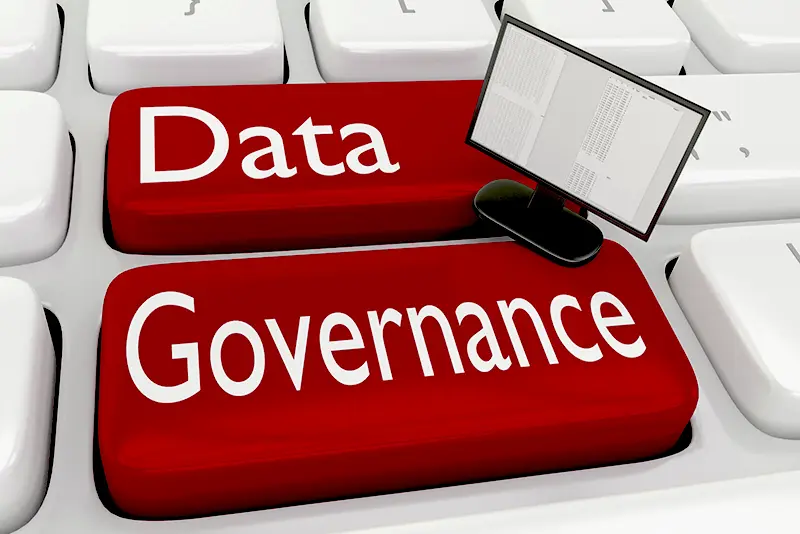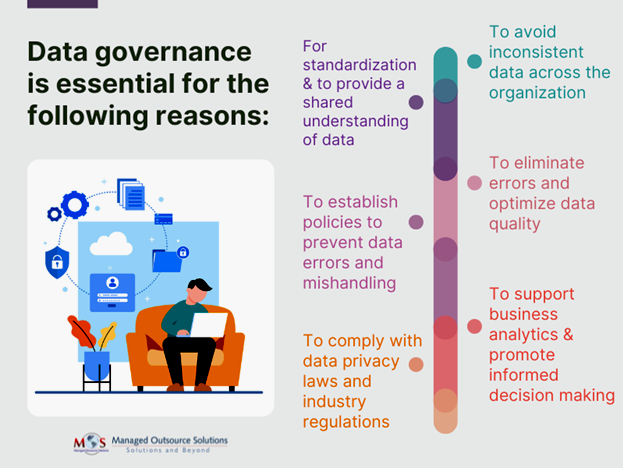Implementing data quality best practices is one of the first steps towards digital transformation. According to Forbes, dirty data costs business organizations up to 12% of total revenue. Data cleansing services are a practical way to remove errors and redundancies from large volumes of data for reliable analytics and business intelligence. So what is data governance and why is it important?
According to Gartner, “Data governance is the specification of decision rights and an accountability framework to ensure the appropriate behavior in the valuation, creation, consumption and control of data and analytics”.
Tech Target defines data governance as “the process of managing the availability, usability, integrity and security of the data in enterprise systems, based on internal data standards and policies that also control data usage”.
So, data governance involves managing data quality and ensuring its security from capture to application, so that right people are using the right methods to manage the data. Good data governance creates business value. Leading IT giants IBM, Google and Microsoft have robust data governance models that allow them to keep ahead of the field.
How Data Governance Makes a Difference
According to a 2020 Gartner survey, 42% of data and analytics leaders do not assess, measure or monitor their data and analytics governance. However, experience shows that data governance should be a key priority when it comes to improving an organization’s success with business intelligence and analytics. Clean, reliable data and data governance drive faster, smarter decisions.
Objectives of Data Governance
Data is the lifeblood of business organizations, but quality matter more than quantity. This is where data governance comes in. Data comes in both structured and unstructured formats. The information has to be readily available, of high quality, and relevant to support data analytics. Good data governance ensures clean, consistent, and trustworthy information to drive data-driven decision making, optimize operations, and propel business growth. Though the objectives of data governance may vary among organizations, they generally include the following:
- Implement a system for clean, consistent data management: This means ensuring accurate data capture and eliminating inaccurate records from a database or table. Data cleaning or cleansing involves identifying and fixing inaccurate, incomplete, irrelevant, duplicate, or other ‘dirty’ data and records. Once the patterns of errors are identified, organizations can adapt data entry procedures to correct those patterns and reduce risk of errors in the future.
- Have standard, repeatable processes for data entry and reporting: Repeatable processes are a set of actions that can be easily duplicated. Establishing common methods, practices, and processes to manage, manipulate and share data across the organization in repeatable manner can promote data optimization.
- Promote proper data usage: Establishing clear policies and effective procedures to monitor data sharing and use is essential. The data in your database must be accessible to authorized users, including clients. Administrators and project teams will need access to the information they need. Likewise, as vendors providing outsourced solutions may need to access your data, they must have advanced back-office technology in place to promote secure and seamless data sharing.
- Ensure data privacy, integrity and security: As data privacy regulations evolve, best practices are necessary to efficiently manage information. This means having reliable networks, strong user access rules, methods, and monitoring, checks for vulnerabilities and risk of breaches, and developing user behavior that support security best practices. Both unstructured and unstructured data should be subject to the same security guidelines.
- Foster informed data-driven decision making: Data governance promotes decision making based on clean, consistent and understandable data: Continually measuring and monitoring data to improve its quality will make insights drawn from useful for decision-making.
Data Governance and Business Value
Every business now knows that data is a strategic asset, but to ensure that it drives value, the right approach is necessary to improve how data is used, analyzed and shared across the organization, increase accountability and improve results. Poor data can lead to missing valuable business opportunities and reduce operational efficiency and productivity across the organization. Proper data governance can prevent these issues and increase business value in many ways:
- Increases revenue: By continually focusing data quality and performance, proper data management can improve business cycle times, enhance customer engagement experiences and retention.
- Lower costs: Improving resource use and process efficiencies via automation and analytics can reduce or even eliminate costs.
- Manage risks: Focus on reducing risk and vulnerabilities, data governance promotes compliance, security and privacy. It can help avoid regulatory and data privacy fines, risk of bad decisions, and loss of competitive advantage.
While data entry companies and data cleansing service providers can ensure effective capture of information, data governance is crucial to secure data and promote its effective use to drive business value.





